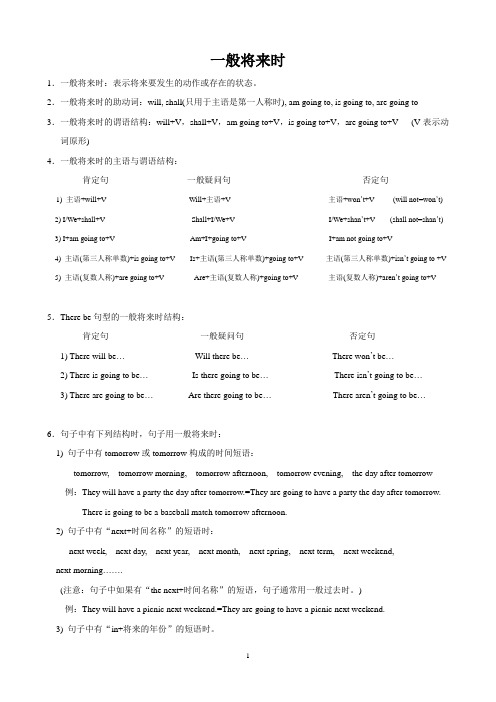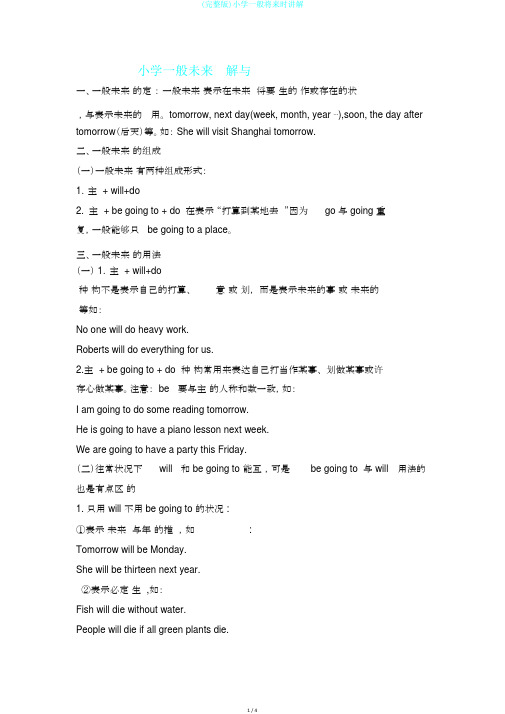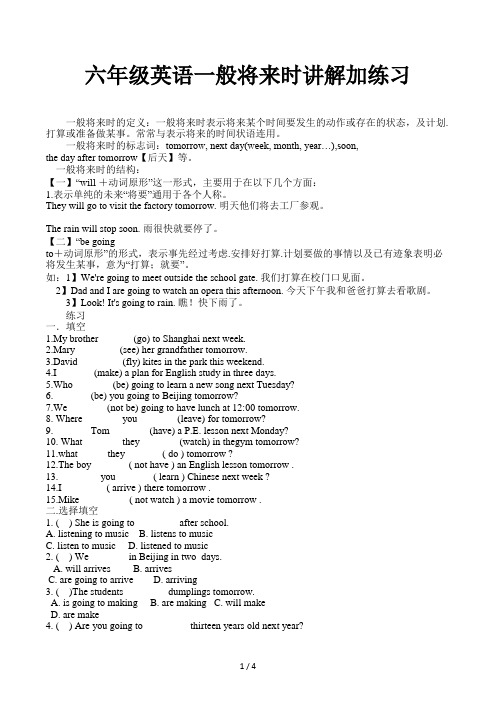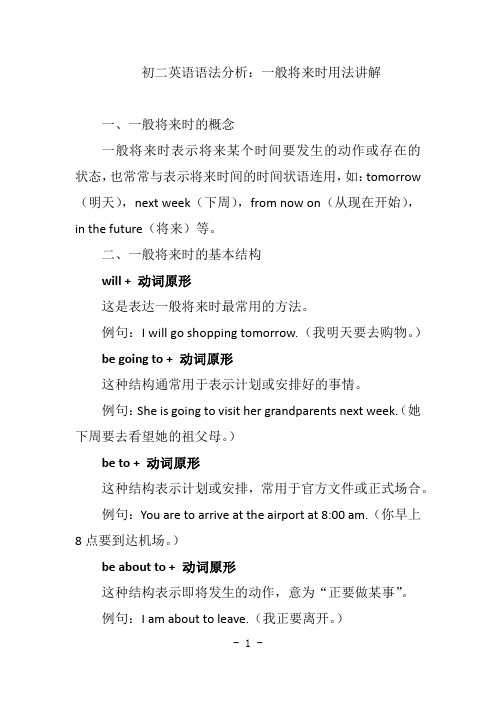一般将来时用法归纳讲解学习
一般将来时用法总结

一般将来时1.一般将来时:表示将来要发生的动作或存在的状态。
2.一般将来时的助动词:will, shall(只用于主语是第一人称时), am going to, is going to, are going to3.一般将来时的谓语结构:will+V,shall+V,am going to+V,is going to+V,are going to+V (V表示动词原形)4.一般将来时的主语与谓语结构:肯定句一般疑问句否定句1) 主语+will+V Will+主语+V 主语+won’t+V (will not=won’t)2) I/We+shall+V Shall+I/We+V I/We+shan’t+V (shall not=shan’t)3) I+am going to+V Am+I+going to+V I+am not going to+V4) 主语(第三人称单数)+is going to+V Is+主语(第三人称单数)+going to+V 主语(第三人称单数)+isn’t going to +V5) 主语(复数人称)+are going to+V Are+主语(复数人称)+going to+V 主语(复数人称)+aren’t going to+V5.There be句型的一般将来时结构:肯定句一般疑问句否定句1) There will be…Will there be…There won’t be…2) There is going to be…Is there going to be…There isn’t going to be…3) There are going to be…Are there going to be…There aren’t going to be…6.句子中有下列结构时,句子用一般将来时:1) 句子中有tomorrow或tomorrow构成的时间短语:tomorrow, tomorrow morning, tomorrow afternoon, tomorrow evening, the day after tomorrow 例:They will have a party the day after tomorrow.=They are going to have a party the day after tomorrow.There is going to be a baseball match tomorrow afternoon.2) 句子中有“next+时间名称”的短语时:next week, next day, next year, next month, next spring, next term, next weekend,next morning…….(注意:句子中如果有“the next+时间名称”的短语,句子通常用一般过去时。
完整版一般将来时时态用法讲解

般将来时时态1. 一般将来时的定义一般将来时表示在现在看来即将要发生的动作或存在的状态。
常用时间副词tomorrow, soon 或短语n ext year / week / mon th, in a few days, in the future, sometime 做状语。
如:What will you do this afternoon ? 你今天下午干什么?We will have a meet ing tomorrow. 我们明天要开会。
He is going to study abroad (到国外) next year.明年他要出国学习。
2. 一般将来时的结构及应用(1) shall / will + 动词原形。
表示即将发生的动作或存在的状态。
特别是表示客观性的事情或在某条件下要发生的事情,只能用此结构。
如:What shall we do if he doesn '如果他不?来,我们该怎么办?Will you be free this evenin g? 今天晚上有空吗?I think he will tell us the truth (真相)。
我想他会告诉我们真实情况的。
(2) be going to +动词原形。
表示已经计划或安排好了的事情,也可表示有迹象表明肯定要发生的事情。
如:We are going to have a meeting to discuss (讨论)the matter this evening. 今天晚上开会讨论这件事情。
Look at the black clouds over there. I think it is going to rain soon. 看一看那边的乌云,我想天要下雨了。
There is going to be an En glish evening this week. 本周要举行一个英语晚会。
(3) be +现在分词。
(完整版)小学一般将来时讲解

小学一般未来解与一、一般未来的定:一般未来表示在未来将要生的作或存在的状,与表示未来的用。
tomorrow, next day(week, month, year ⋯),soon, the day after tomorrow(后天)等。
如: She will visit Shanghai tomorrow.二、一般未来的组成(一)一般未来有两种组成形式:1.主 + will+do2.主 + be going to + do 在表示“打算到某地去”因为 go 与 going 重复,一般能够只 be going to a place。
三、一般未来的用法(一) 1.主 + will+do种构不是表示自己的打算、意或划,而是表示未来的事或未来的等如:No one will do heavy work.Roberts will do everything for us.2.主 + be going to + do 种构常用来表达自己打当作某事、划做某事或许存心做某事。
注意: be 要与主的人称和数一致,如:I am going to do some reading tomorrow.He is going to have a piano lesson next week.We are going to have a party this Friday.(二)往常状况下will和be going to能互,可是be going to 与 will用法的也是有点区的1. 只用 will 不用 be going to 的状况 :①表示未来与年的推,如:Tomorrow will be Monday.She will be thirteen next year.②表示必定生 ,如:Fish will die without water.People will die if all green plants die.2.只用 be going to 而不用 will 的状况:假如表示已有迹象表示在不久的未来要发生的事情时,如:Look at those black clouds, It’ s going to rain.(三)某些动词如: go/come/leave/start/begin/arrive等,它们的此刻进行时能够表示未来时,如:They are leaving for Shanghaitomorrow.My brother is coming here soon.四、一般未来时的句式变换一定句:主语 + will+do主语 + be going to + do否认句:主语 + will+not+do (will not可缩写成won’t)主语 + be+ not+ going to +do一般疑问句:will+ 主语 + dobe+主语 +going to+do特别疑问句:疑问词 + will+ 主语 +do疑问词 +be+主语 +going to+do五.稳固练习一、按要求填空1.我打算明日和朋友去野炊。
六年级英语一般将来时讲解加练习

六年级英语一般将来时讲解加练习一般将来时的定义:一般将来时表示将来某个时间要发生的动作或存在的状态,及计划.打算或准备做某事。
常常与表示将来的时间状语连用。
一般将来时的标志词:tomorrow, next day(week, month, year…),soon,the day after tomorrow【后天】等。
一般将来时的结构:【一】“will +动词原形”这一形式,主要用于在以下几个方面:1.表示单纯的未来“将要”通用于各个人称。
They will go to visit the factory tomorrow. 明天他们将去工厂参观。
The rain will stop soon. 雨很快就要停了。
【二】“be goingto+动词原形”的形式,表示事先经过考虑.安排好打算.计划要做的事情以及已有迹象表明必将发生某事,意为“打算;就要”。
如:1】We're going to meet outside the school gate. 我们打算在校门口见面。
2】Dad and I are going to watch an opera this afternoon. 今天下午我和爸爸打算去看歌剧。
3】Look! It's going to rain. 瞧!快下雨了。
练习一.填空1.My brother ______ (go) to Shanghai next week.2.Mary ________ (see) her grandfather tomorrow.3.David ________ (fly) kites in the park this weekend.4.I_______ (make) a plan for English study in three days.5.Who _______ (be) going to learn a new song next Tuesday?6._______ (be) you going to Beijing tomorrow?7.We _______ (not be) going to have lunch at 12:00 tomorrow.8. Where _______ you _______ (leave) for tomorrow?9._______ Tom _______ (have) a P.E. lesson next Monday?10. What _______ they _______ (watch) in thegym tomorrow?11.what _____ they _______( do ) tomorrow ?12.The boy _______( not have ) an English lesson tomorrow .13.________ you _______( learn ) Chinese next week ?14.I ________ ( arrive ) there tomorrow .15.Mike _________ ( not watch ) a movie tomorrow .二.选择填空1. ( ) She is going to ________ after school.A. listening to musicB. listens to musicC. listen to musicD. listened to music2. ( ) We _______ in Beijing in two days.A. will arrivesB. arrivesC. are going to arriveD. arriving3. ( )The students ________ dumplings tomorrow.A. is going to makingB. are makingC. will makeD. are make4. ( ) Are you going to_________ thirteen years old next year?A. will beB. areC. beD. go5. ( ) ___will see a play in 5 days?A. WhenB. WhatC. WhoD. Whose6. ( ) Mary______ English next year.A. will learnB. will to learnC. are going to learn.D. learns7. ( ) He’ll _____ shopping this afternoon.A. goingB. goC. goesD. went8. ( ) Will you ____ at the bus stop at 10:30?A. meetingB. meetsC. meetD. met9. ( ) Lily and I _______ the guitar. next week.A. am going to playB. are going to playC. will playsD. play10. ( ) How ______ Jenny ___ home tomorrow?A. does......goB. is……goingC. will……goD. do……g o11. ( ) Who is going to _________ a song ?A. sings B singing C. to sing D. sing12. ( ) I _________in Beijing in three days.A. are going to arriveB. arriveC. will arriveD. arrives13. ( ) He _______some model planes tomorrow .A. going to makeB. is makingC. will make D makes14. ( ) Are you going to ___________a doctor next year ?A. will beB.. areC. beD. are going to15. ( ) She ________ you make supper this evening .A. helpsB. will helpC. is helpingD. is going help三.把下列句子变成一般疑问句,并给出肯定和否定回答。
初二英语语法分析--一般将来时用法讲解

初二英语语法分析:一般将来时用法讲解一、一般将来时的概念一般将来时表示将来某个时间要发生的动作或存在的状态,也常常与表示将来时间的时间状语连用,如:tomorrow (明天),next week(下周),from now on(从现在开始),in the future(将来)等。
二、一般将来时的基本结构will + 动词原形这是表达一般将来时最常用的方法。
例句:I will go shopping tomorrow.(我明天要去购物。
)be going to + 动词原形这种结构通常用于表示计划或安排好的事情。
例句:She is going to visit her grandparents next week.(她下周要去看望她的祖父母。
)be to + 动词原形这种结构表示计划或安排,常用于官方文件或正式场合。
例句:You are to arrive at the airport at 8:00 am.(你早上8点要到达机场。
)be about to + 动词原形这种结构表示即将发生的动作,意为“正要做某事”。
例句:I am about to leave.(我正要离开。
)be due to + 动词原形这种结构表示某事预定或预期将要发生。
例句:The train is due to arrive at 5:00 pm.(火车预定下午5点到达。
)三、一般将来时的用法1表示将来的动作或状态例句:I will buy a new car next year.(明年我要买一辆新车。
)2表示将来的计划或安排例句:We are going to have a picnic this weekend.(我们这个周末要去野餐。
)3表示根据现有情况推测未来的可能性例句:It's going to rain soon.(很快就要下雨了。
)4表示命令、请求、建议等例句:You are to finish your homework before you go out.(你出去之前要把作业做完。
小学五年级重点知识归纳一般将来时的用法与句型构造

小学五年级重点知识归纳一般将来时的用法与句型构造【小学五年级重点知识归纳:一般将来时的用法与句型构造】一、一般将来时的用法一般将来时表示将来某个时间会发生的事情或者存在的状态。
它通常用来表达计划、打算、预测、意愿等。
二、一般将来时的句型构造1. 肯定句结构:主语 + will + 动词原形 + 其他成分例句:I will go to the park tomorrow.2. 否定句结构:主语 + will not / won't + 动词原形 + 其他成分例句:She won't eat dinner with us tonight.3. 疑问句结构:Will + 主语 + 动词原形 + 其他成分?例句:Will they visit their grandparents this weekend?4. 特殊疑问句结构:特殊疑问词 + will + 主语 + 动词原形 + 其他成分?例句:Where will you go on your vacation?三、一般将来时的常见时间状语1. tomorrow(明天)2. next week(下周)3. in the future(将来)4. soon(很快)5. in a year(一年后)等等四、一般将来时的其他用法1. 表示预测或推测的句子,常使用的词汇有:think,believe,hope,expect等。
例句:I think it will rain later.我认为一会儿会下雨。
2. 表示意愿、请求、建议等情态动词的用法。
例句:I will help you with your homework.我会帮你写作业。
五、一般将来时使用注意事项1. 在一般将来时中,主语为第三人称单数时,动词要加上“s”或者“es”。
例句:He will playsoccer with his friends tomorrow.2. 一些动词在一般将来时的变化形式是不规则的,需要特别注意。
一般将来时态知识点详解(初中英语专项复习) (4)
一般将来时态知识点详解(初中英语专项复习)知识点01 一般将来时主要构成形式【语法详解】一般将来时表示将来某个时间要发生的动作,事情或存在的状态,也表示将来经常或反复发生的动作或事情。
肯定句:1、主语+will/shall+动词原形。
2、主语+am/is/are+going+to+动词原形。
3、主语+am/is/are+to+动词原形。
4、主语+am/is/are+现在分词。
5、主语+am/is/are+going to+动词原形。
标志词:tomorrow, next day(week, month, year…),soon, in a few minutes, by…,the day after tomorrow。
详细用法:1. will/shall+动词原形,shall用于第一人称,常被will 所代替。
will在陈述句中用于各人称,在征求意见时常用于第二人称,will not=won’t,shall not=shan’t。
Which paragraph shall I read first? 我先读哪一段呢?Will you be at home at seven this evening? 今晚七点回家好吗?2. be going to +不定式,表示将来。
a. 主语的意图,即将做某事。
What are you going to do tomorrow? 明天打算作什么呢?b. 计划、安排要发生的事。
The play is going to be produced next month这出戏下月开播。
c. 有迹象要发生的事。
Look at the dark clouds, there is going to be a storm. 看那乌云,暴风雨快来了。
3. be +不定式表将来,按计划或正式安排将发生的事。
We are to discuss the report next Saturday. 我们下星期六讨论这份报告。
一般将来时讲解
一般将来时讲解一、概念:一般将来时表示将要发生的动作或存在的状态及打算、计划或准备做某事。
一般将来时由助动词shall或will加动词原型构成,shall用于第一人称,will用于第二、三人称。
二.时间状语:tomorrow, next day(week, month, year…),soon, in a few minutes, by…,the day after tomorrow, in the future etc.三.基本结构:1、肯定句⑴主语+ will/shall + do.+其他⑵主语+am/is/are + going to + do +其他Will 用于各种人称,shall 用于第一人称,be 随人称,数和时间的变化而变化,will 在代词后常简略为’ll。
2.否定形式:主语+ am/is/are + not + going to do ;主语+will/shall+ not+ do。
3.一般疑问句:将will/shall/ be提到主语前面。
辨析:will + 动词原形与be going to + 动词原形的区别(1)“will + 动词原形”表示单纯意义“将来要(会)……”,没有计划性。
They will go with us. 他们将和我们一起去。
(2) “be going to + 动词原形“表示将要发生……”、“打算、计划、决定要……或有迹象、征兆表明将要……”What are we going to do next Sunday?下个星期天我们打算做什么?四、注意1、在时间或条件状语从句中,一般不能用将来时态,而用一般现在时态代替:T hey’ll call me when they arrive in Beijing.I’ll come to see you if I have time tomorrow.2、一些表示位置移动的词如come, go, leave, fly, start, arrive. return等可以用现在进行时表将来,--- Where are you going? 你要去哪儿?--- I’m going to the park. 我要去公园。
一般将来时和将来进行时的用法总结
一般将来时和将来进行时的用法总结一、一般将来时的用法一般将来时表示将来某个时间会发生的动作或状态。
其构成为:助动词"will"(或“shall”,在第一人称单数和复数使用“shall”)加动词原形。
1. 表示将来的事实、事件或计划:例如:- Tomorrow I will go shopping with my friends. (明天我将和朋友们去购物。
)- She will start her new job next month. (她下个月将开始新工作。
)2. 表示意愿、请求、建议或承诺:例如:- I will help you with your homework. (我会帮助你做家庭作业。
)- Will you please pass me the salt? (请你递给我盐好吗?)- We will need to leave early if we want to catch the train. (如果我们想赶上火车,我们需要早些离开。
)- I promise I will be more careful next time. (我保证下次会更小心。
)3. 表示预测或猜测:例如:- It will rain tomorrow. (明天会下雨。
)- I think he will pass the exam. (我认为他会通过考试。
)二、将来进行时的用法将来进行时表示将来某个时间点正在进行的动作。
其构成为:助动词"will be"加动词的现在分词形式(动词+ing)。
1. 表示针对未来某一时刻已安排好的事情:例如:- This time tomorrow, I will be flying to Paris. (明天的这个时候,我将在飞往巴黎的途中。
)- They will be having a meeting at 3 o'clock tomorrow afternoon. (明天下午3点他们将正在开会。
英语动词时态用法归纳:一般将来时
英语动词时态用法归纳:一般将来时一、一般将来时的构成一般将来时的由s hall / will+ 动词原形构成。
二、一般将来时的基本用法(1) 表示单纯的将要发生的动作或情况。
常与表示将来的时间状语连用。
如:Tomorrow will be Sunday. 明天是星期天。
They say that it will rain. 他们说要下雨。
I’ll be thirty-seven on my next birthday. 到下次生日,我就三十七岁了。
We won’t be free tonight. 今晚我们没空。
(2) 也可以表示临时决定要做的事。
如:—I thought I asked you to sweep the floor.—O h, I’m sorry. Mother, I will do it right now.—我原以为我让你扫地了。
—噢,对不起,妈妈,我就做。
—You have left the door open.—O h, so I have. I’ll go and lock it.—你忘了锁门。
—哦,是的。
我就去。
(3) 有时虽没有时间状语,但从意思上可以判断指将来的动作。
如:Who will take the chair? 谁当主席?You will pass the examination. 你会通过那个考试的。
The meeting won’t last long. 会开不了多久。
(4) 一般将来时有时还表示倾向和习惯性。
如:Oil will float on water. 油总浮在水面上。
Fish will die without water。
鱼离开水就会死掉。
The machine won't work because of a faulty connection. 机器电源线接错了,所以开不动。
三、表示将来时的几种方法(1) be going to+动词原形。
- 1、下载文档前请自行甄别文档内容的完整性,平台不提供额外的编辑、内容补充、找答案等附加服务。
- 2、"仅部分预览"的文档,不可在线预览部分如存在完整性等问题,可反馈申请退款(可完整预览的文档不适用该条件!)。
- 3、如文档侵犯您的权益,请联系客服反馈,我们会尽快为您处理(人工客服工作时间:9:00-18:30)。
一般将来时用法归纳
一般将来时用法归纳
使用一般将来时注意事项:
①Will在疑问句中,用来表示有礼貌地征询对方的意见。
Will you have some more tea? 要不要再喝点茶?
②Shall we/I …? 用于主动提供帮助、建议或询问意见。
Shall we have some lunch? 我们要不要吃点午饭?
Shall I help you with your bag? 要不要我帮你拿包?Where shall we meet? 我们要在哪里碰头呢?
What shall we do this weekend? 本周末我们要干什么?
③“be going to +动词原形”表示主观上打算在将来某个时间要做某事。
Her mother is going to buy her a new bike. 她妈妈要给她买辆新自行车。
④“be going to +动词原形”还可以表示“预见”,即现在已有迹象表明将要发生或即将发生某种情况。
It's going to rain. 快要下雨了。
⑤用一般现在时表示将来意义。
在时间和条件状语从句中,如果主句是一般将来时,从句习惯上用一般现在时表示将来的意义。
即所谓的“主将从现”。
时间状语从句主要由以下词引导:when, while, after, before, as soon as, not…until等。
条件状语从句主要由以下词引导:if, unless等。
如:Please tell him to go when he comes. 他来时,就让他去。
⑥用位置移动的行为动词的现在进行时表示将来意义。
这些动词有 come, go, leave, arrive 等。
如:
We are leaving tomorrow. 我们明天要走了。
----Where are you going? ----I am going for a walk. 你去哪?我去散步。
